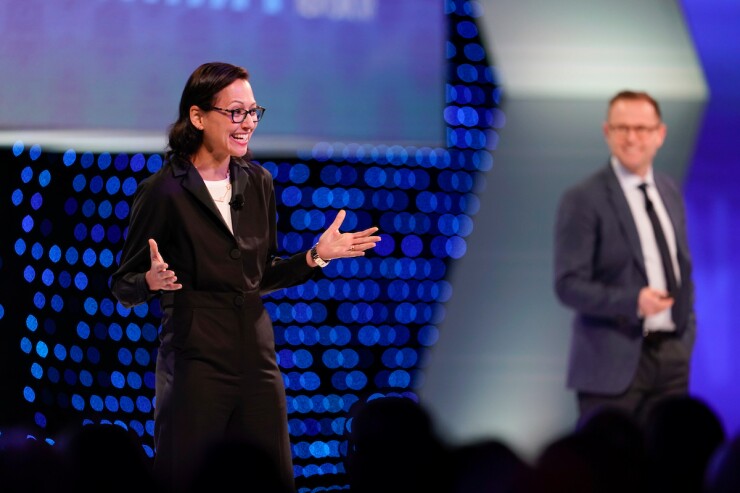Over the past five years, 10 million visas and green cards have been issued to immigrants in the U.S.
When they apply for a credit card or loan, no matter how solid their creditworthiness in their home country, these newcomers tend to be rejected because of their lack of credit history in this country.

This is a missed opportunity, says Sara Milsten, senior vice president of new member acquisition for U.S. consumer services at American Express.
“Most of them exhibit prime or super-prime credit behavior, so they're an attractive set of borrowers,” she said. “The majority of these visa types fall into categories that include pursuit of education and special occupation. These are ambitious students and young professionals coming to the U.S. to pursue their next great opportunity.”
American Express has worked with the fintech startup Nova Credit to launch a new service Friday that uses credit reports and scores from five countries — Australia, Canada, India, Mexico and the U.K. — to issue any of Amex's personal credit cards, including Green, to newcomers to the U.S.
Other fintechs provide credit cards to immigrants.
The Amex-Nova effort is the first attempt to use the credit bureau work done in other countries to lend in the U.S.
In a pilot American Express has been running, “newcomers from these five countries are more than five times as likely to be approved as they would be through traditional underwriting solutions for new-to-credit applicants,” Milsten said. “One of the things that both Nova and American Express have found to be true is that credit behaviors don't change when people move across borders. So if you exhibited strong credit behavior in one market, the likelihood is that as you move through another market, you will behave similarly and your risk profile will be quite similar.”
Exchange students and immigrants in specialized professions tend to have thick credit files and high credit scores in their home countries, according to Sarah Davies, head of risk and analytics at Nova.
“This is an incredibly high-credit-quality populace; the majority are prime and super-prime,” she said. “We bring all of that information over, put it in a U.S. frame of reference, and reinterpret the score into a U.S. paradigm. It sort of removes that invisibility that this population has when they first arrive in the country.”
How it works
In the five countries from which American Express is accepting credit bureau data, the local bureaus report how people borrow and repay money, just as they do here.
What is different in those other countries, according to Davies, is the diversity of product types. In the U.S. there is a fairly narrow spectrum of cards, loans and mortgages. Other countries have microfinance loans, savings club loans (in the U.K., for instance), gold-backed loans and other products with different repayment terms and structures that do not exist here.
“But everything fundamentally gets down to what have you borrowed and how have you repaid, and that has allowed us to bring all this information into a consistent interpretation,” Davies said. “That's the key function that Nova has been performing on the credit data from all these different countries.”
Nova’s technology translates the foreign credit bureau reports into data, formatting and scores that a U.S. card issuer or bank underwriting system can make sense of. Data queries are made to the credit bureaus, and knowledge-based authentication is used to help verify the identity of the applicant.
This information is sent through an application programming interface into American Express’ online application system and enables the card company to make a quick decision and provide a virtual card immediately. A plastic or metal card can be mailed later.
Until American Express began piloting the software, if someone from one of the five countries who did not have a credit history in the U.S. tried to apply for a card, American Express would take the application offline for review and try to get enough information to make an underwriting decision, Milsten said.
“The process felt very different for the prospective applicants, and our ability to successfully extend credit was lower because we lacked the information that we have available to us now through our partnership with Nova,” she said.
American Express is the first financial services company to pilot and launch the technology. There are a few other pilots underway, Davies said.





